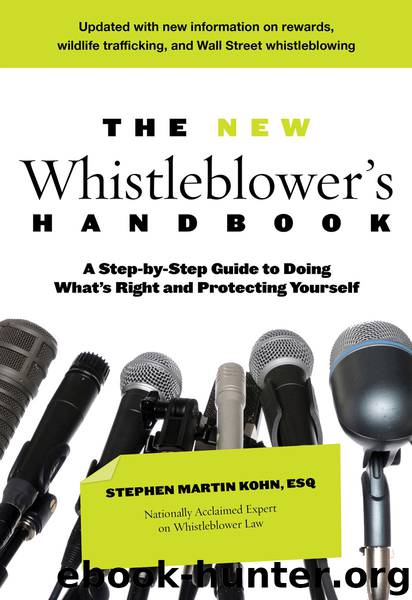The New Whistleblower's Handbook by Stephen Kohn

Author:Stephen Kohn
Language: eng
Format: epub
ISBN: 9781493028825
Publisher: Lyons Press
Back to the Future: Internal Whistleblower Protections Under Dodd-Frank
As part of the historic financial reforms enacted after the 2008 financial crisis, Congress added an antiretaliation law to the legal arsenal available to Wall Street whistleblowers. The Securities Exchange Act was amended to provide employees with direct access to federal court and award them double back pay, among other damages. When initially proposed, this law contained a narrow definition of a protected activity, reminiscent of the type of language used in the 1969 Mine Health and Safety Act at issue in the Phillips case. Both the Senate and House bills defined whistleblowing as disclosing information to the Commission (i.e., the government). Neither bill explicitly protected internal whistleblowers.
While Congress was reconciling the House and Senate versions of the Dodd-Frank Act, the Senate Banking Committee became concerned that internal whistleblowers might not be protected under the Act. An eleventh-hour change was made.
Here is the history behind this change. On April 23–24, 2010, while the bill was being finalized in conference, the Senate Banking Committee showed the final (and approved) draft of the Securities and Exchange Act’s whistleblower law to the National Whistleblower Center (NWC). The committee staff wanted to make doubly sure that the whistleblower law would work. On April 24 the NWC staff, fully familiar with the historic disputes over the scope of protected activities under the Mine Health and Safety Act and similar laws, proposed adding a new provision to the Act to ensure that internal whistleblowers were protected.
The NWC recommended expanding the definition to forestall any debate as to the scope of protected activities. As reflected in the e-mail to the Senate Banking Committee by the NWC on April 24, the NWC proposed incorporating by reference two provisions in the 2002 Sarbanes-Oxley Act (SOX). The first provision, Section 301, explicitly protected employees who raised concerns with their managers or compliance officials. The second provision, Section 1107, also protected employees who provided information to the Department of Justice or other federal law enforcement agencies, other than the SEC.
The NWC’s proposal recommended adding a new subsection (iii) to the definition of protected activity, covering “disclosures” that were “required, authorized or protected” under these two sections of SOX, as well as protecting employees who made disclosures under “any other law, rule or regulation subject to the jurisdiction of the Securities and Exchange Commission.” The reason for this recommendation was to make sure that certain disclosures frequently made by employees did not fall through the cracks. Internal disclosures to management through the “audit committee” process were one such “crack.” With this change, Congress could avoid the frustrating judicial debates that had occurred under prior laws and ensure that a common sense approach toward whistleblowing would be followed.
The Senate Banking Committee approved this change, and it was incorporated, nearly word for word, into the final bill.
One might assume that this would end the argument. Not only did congressional and case-law precedent support the “common sense” interpretation given to these types of laws, but statutory langue was added that should have foreclosed any debate.
Download
This site does not store any files on its server. We only index and link to content provided by other sites. Please contact the content providers to delete copyright contents if any and email us, we'll remove relevant links or contents immediately.
The Social Psychology of Inequality by Unknown(2304)
The Plant Paradox by Dr. Steven R. Gundry M.D(2035)
The Writing on the Wall by Anselm Jappe(1756)
Working for Yourself by J.D. (Nolo) Stephen Fishman(1474)
Every Landlord's Legal Guide by Janet Portman & Stewart Marcia & Ralph Warner(1318)
The First 20 Hours: How to Learn Anything ... Fast by Kaufman Josh(1302)
ADHD on Trial by Michael Gordon(1236)
Decisive by Chip Heath(1195)
Drafting Contracts: How and Why Lawyers Do What They Do, Second Edition by Stark Tina L(1169)
Working for Yourself by Stephen Fishman J.D. (Nolo)(1135)
The Economist Aug 8th 2015 by The Economist(1122)
Restitution by Restitution(1111)
The Economist Aug 29th 2015 by The Economist(1094)
Intellectual Property Strategy by John Palfrey(1079)
The Lord of the Rings: The Fellowship of the Ring, the Two Towers, the Return of the King by J. R. R. Tolkien(1079)
A Practical Guide to International Arbitration in London by Hilary Heilbron(1077)
Collusion by Luke Harding(1041)
Persuasion by Owner(1008)
Chapter 1 by Owner(945)
